Previous - Irish coins before euro
Irish euro coins - catalog with values
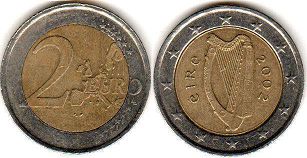
2 euro 2002 (2002-2006)
bi-metallic - nickel-brass/copper-nickel
circulating coinage
2 EURO
EIRE 2002
Coin value ~ 3-4 USD
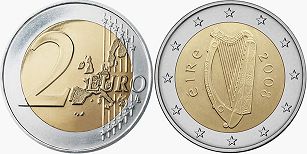
2 euro 2008 (2007- )
bi-metallic - nickel-brass/copper-nickel
circulating coinage
2 EURO
EIRE 2008
Coin value ~ 3-5 USD
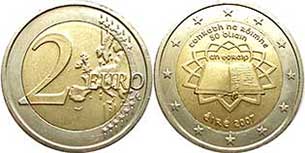
2 euro 2007
bi-metallic - nickel-brass/copper-nickel
commemorative coin
50th Anniversary of the Treaty of Rome (forming the constitutional basis of the European Union)
2 EURO
CONRADH NA RÓIMHE 50 BLIAIN AN EORAIP / 2007 ÉIRE
Coin value ~ 8-12 USD
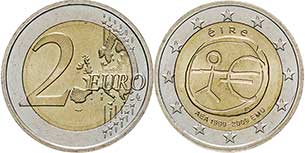
2 euro 2009
bi-metallic - nickel-brass/copper-nickel
commemorative coin
10th Anniversary of Economic and Monetary Union
2 EURO
ÉIRE / AEA 1999-2009
Coin value ~ 8-10 USD
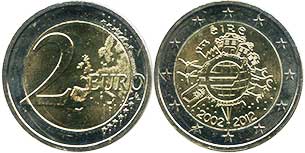
2 euro 2012
bi-metallic - nickel-brass/copper-nickel
commemorative coin
10th anniversary of the introduction of euro cash
2 EURO
ÉIRE / 2002-2012
Coin value ~ 5-7 USD
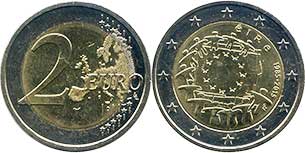
2 euro 2015
bi-metallic - nickel-brass/copper-nickel
commemorative coin
30th anniversary of the EU flag
2 EURO
ÉIRE 1985-2015
Coin value ~ 3-4 USD
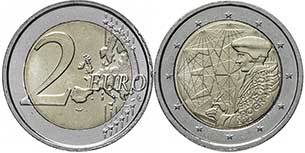
2 euro 2022
bi-metallic - nickel-brass/copper-nickel
commemorative coin
35 years of the Erasmus Programme
2 EURO
1987-2022 ERASMUS PROGRAMM ÉIRE
Coin value ~ 4-5 USD
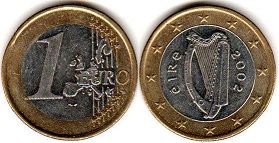
1 euro 2002 (2002-2006)
bi-metallic - copper-nickel/nickel-brass
1 EURO
EIRE 2002
Coin value ~ 2-3 USD
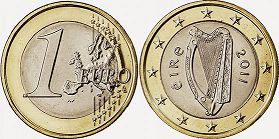
1 euro 2011 (2007- )
bi-metallic - copper-nickel/nickel-brass
1 EURO
EIRE 2011
Coin value ~ 3-5 USD
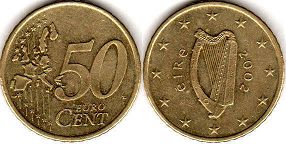
50 euro cent 2002 (2002-2006)
brass
50 EURO CENT
EIRE 2002
Coin value ~ US$1
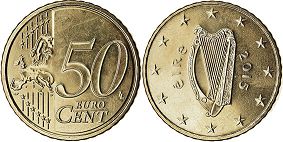
50 euro cent 2015 (2007- )
brass
50 EURO CENT
EIRE 2015
Coin value ~ 2-4 USD
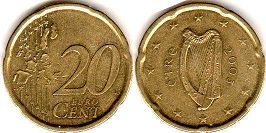
20 euro cent 2003 (2002-2006)
brass
20 EURO CENT
EIRE 2003
Coin value < US$1
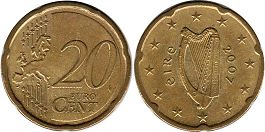
20 euro cent 2007 (2007- )
brass
20 EURO CENT
EIRE 2007
Coin value < US$1
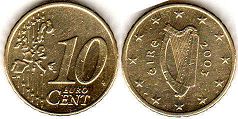
10 euro cent 2003 (2002-2006)
brass
10 EURO CENT
EIRE 2003
Coin value < US$1
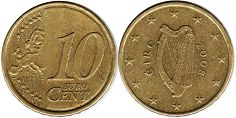
10 euro cent 2008 (2007- )
brass
10 EURO CENT
EIRE 2008
Coin value < US$1
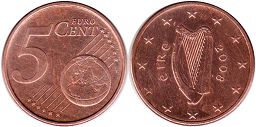
5 euro cent 2008 (2002- )
copper plated steel
5 EURO CENT
EIRE 2008
Coin value < US$1
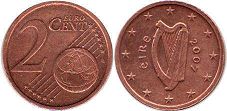
2 euro cent 2007 (2002- )
copper plated steel
2 EURO CENT
EIRE 2007
Coin value < US$1

1 euro cent 2005 (2002- )
copper plated steel
1 EURO CENT
EIRE 2005
Coin value < US$1
Commemorative euro coins of Ireland - chart with prices
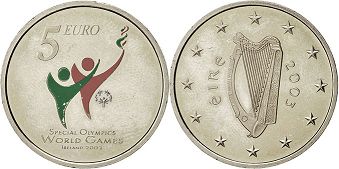
5 euro 2003
copper-nickel
Special Olympics Games
5 EURO / SPECIAL OLYMPIC WORLD GAMES IRELAND 2003 / Denomination and multicolor games logo
EIRE 2003
Coin value ~ 10-20 USD

2 euro 2007
bi-metallic - nickel-brass/copper-nickel
50th Anniversary Treaty of Rome
2 EURO / Denomination and map
CONRADH NA ROIMHE 50 BLIAIN / AN EORAIP / EIRE 2007 / Open treaty book, stars around
Coin value ~ 4-6 USD

2 euro 2009
bi-metallic - nickel-brass/copper-nickel
10th Anniversary of EMU (European Economic and Monetary Union)
2 EURO / Denomination and map
EIRE / AEA 1999-2009 EMU / Stylized figure with euro symbol, stars around
Coin value ~ 5-7 USD

2 euro 2012
bi-metallic - nickel-brass/copper-nickel
10th Anniversary of Euro coinage
2 EURO / Denomination and map
EIRE / 2002 2012 / Euro symbol on globe with child-like rendering, stars around
Coin value ~ 5-7 USD

2 euro 2015
bi-metallic - nickel-brass/copper-nickel
30th Anniversary of European Flag
2 EURO / Denomination and map
EIRE 1985-2015 / People surrounding starred flag, stars around
Coin value ~ 4-6 USD
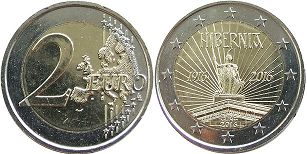
2 euro 2016
bi-metallic - nickel-brass/copper-nickel
100th Anniversary of Easter Rising
2 EURO / Denomination and map
HIBERNIA / 1916 2016 / EIRE 2016 / Statue of Hibernia perched at the top of the General Post Office building, rays and stars around
Coin value ~ 4-6 USD
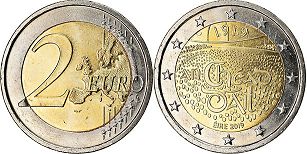
2 euro 2019
bi-metallic - nickel-brass/copper-nickel
100th Anniversary of the First Dáil (the first meeting of the Irish Republic parliament)
2 EURO / Denomination and map
AN CHEAD DAIL / EIRE 2019 / Stylized image of Dublin City Hall's Round Hall
Coin value ~ 3-5 USD
Euro coins of other countries
AndorraAustria
Belgium
Croatia
Cyprus
Estonia
Finland
France
Germany
Greece
Italy
Latvia
Lithuania
Luxembourg
Malta
Monaco
Netherlands
Portugal
San Marino
Slovakia
Slovenia
Spain
Vatican
Costs of Irish euro coins in this catalog approximate and indicated specifically for the coin shown in the picture.
I do not buy or sell coins - this is just a catalog.

